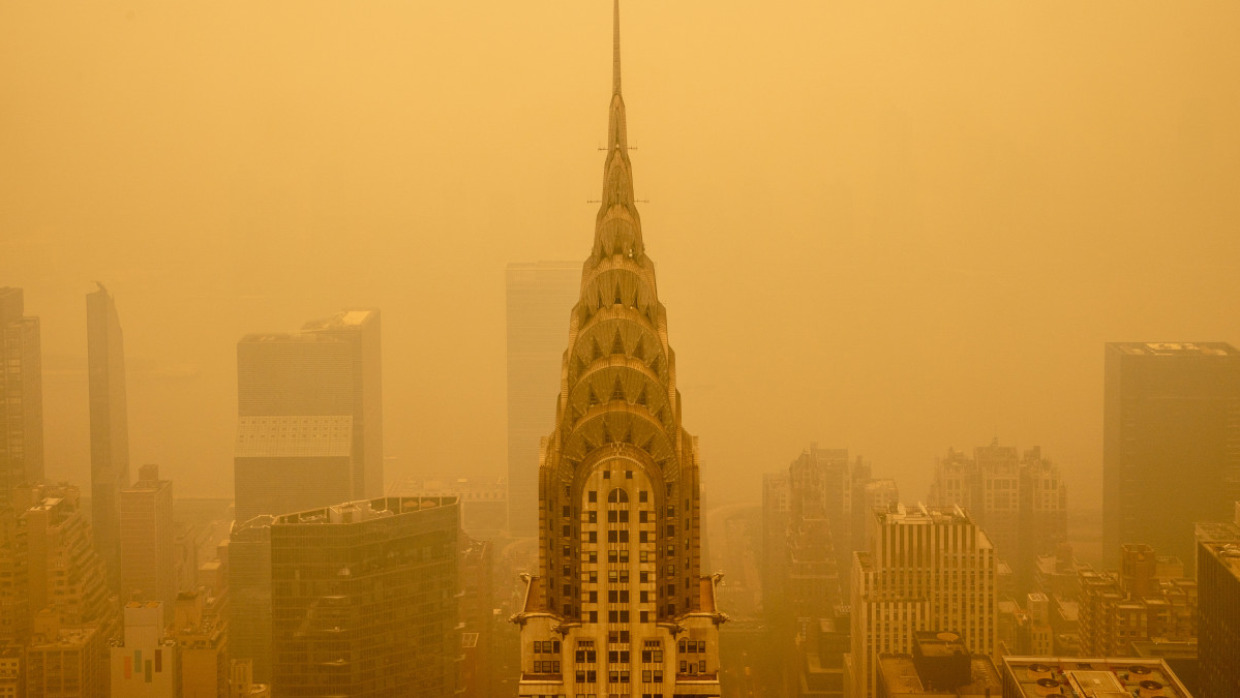 Vampire Weekend's Surprising Jewish Stories
Vampire Weekend's Surprising Jewish Stories


5 min read
Embracing the fog and messiness of life.
This week the combination of raging Canadian wildfires and strong winds plunged much of the eastern United States into sudden, intense air pollution. The air quality in New York City was the worst in the world. And the pictures of the eerie, orange haze enveloping the George Washington Bridge seemed surreal.
Around 98 million people in parts of 18 states from New Hampshire to South Carolina were under air quality alerts on Wednesday morning. Flights were temporarily grounded at LaGuardia Airport, and many of us had the kind of shocked expression on our faces that we momentarily had when the pandemic first began: I’ve never seen anything like this in my life. What is happening?
Millions of people are being advised to stay indoors for an indefinite amount of time, plans have been cancelled. I used to believe that if I could properly manage the important things in my life – my marriage, my kids, my work – I would find happiness. But the illusion that you can make life fit into your plans and that everything will work out the way you want it to actually makes it harder to cope with the inevitable wildfires in your life.
In his books The Antidote: Happiness for People Who Can’t Stand Positive Thinking and Four Thousand Weeks: Time Management for Mortals, Oliver Burkeman shares with us crucial lessons for coping without false positivity. Here are four of them.
Don’t try to eliminate negative feelings from your life. It’s normal to sometimes feel sad or fearful or disappointed. “The effort to try to feel happy is often precisely the thing that makes us miserable. And it is our constant efforts to eliminate the negative-insecurity, uncertainty, failure or sadness – that is what causes us to feel so insecure, anxious, uncertain or unhappy.”
See life’s challenges as they are and commit to coping with them the best you can without false reassurances about the future. You don’t have to try to convince yourself that everything will work out in order to deal with the unexpected difficulties that will inevitably come your way.
Yes, Rabbi Akiva taught, “Everything God does is for the best” (Talmud, Brachot, 60b). But that does not mean it won’t be without any pain.
With all our technology and knowledge, it sometimes feels like you can solve every problem. But Judaism teaches us that only God is in control, and there is nothing else besides Him. Paradoxically, recognizing and accepting that you are not in control gives you the faith to be able to move forward. “True security lies in the unrestrained embrace of insecurity – in the recognition that we never really stand on solid ground and never can. I came to understand that happiness and vulnerability are often the same thing.”
You will never get to the point where you have finished everything you need to do and have the time to find meaning in your life. You need to find and create meaning now. “The day will never arrive when you finally have everything under control – when the flood of emails has been contained; when your to-do lists have stopped getting longer; when you’re meeting all your obligations at work and in your home life; when nobody’s angry at you for missing a deadline or dropping the ball; and when the fully optimized person you’ve become can turn, at long last, to the things life is really supposed to be about.”
The great Jewish sage Hillel said, “Don’t say, ‘When I have some free time I will learn Torah, because you may never have free time” (Ethics of the Fathers, 2:5). Don’t wait for the right moment to grow; do it now.
The moment you are living in right now is not just a way to prepare for some future moment. It is life itself, which can only be lived when you are present and aware of what you are experiencing in the here and now.
“Our lives, thanks to their finitude, are inevitably full of activities that we’re doing for the very last time. Just as there will be a final occasion on which I pick up my son – a thought that appalls me, but one that’s hard to deny, since I surely won’t be doing it when he’s thirty – there will be a last time you visit your childhood home or swim in the ocean or have a deep conversation with a certain close friend. Yet usually there’ll be no way to know, in the moment itself, that you’re doing it for the last time. And indeed there’s a sense in which every moment of life is a ‘last time.’ To treat all these moments solely as stepping-stones to some future moment is to demonstrate a level of obliviousness to our real situation that would be jaw-dropping if it weren’t for the fact that we all do it, all the time.”
The wildfire is reminding me to let go of the need for certainty. To let go of the need for a perfect plan and embrace the fog and messiness of life.
